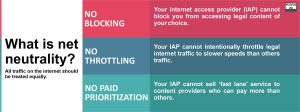08 Nov Net neutrality
This article covers “Daily Current Affairs” and the topic details “ Net neutrality”. This topic has relevance in the Governance section of the UPSC CSE exam.
For Prelims:
About Net neutrality?
For Mains:
GS 2: Governance
Importance of Maintaining Net Neutrality?
Flawed Arguments Affecting Net Neutrality?
Why in the news?
In response to the government’s request, the Telecom Regulatory Authority of India (TRAI) initiated an extensive consultation process to examine the necessity and potential approaches for regulating Over-The-Top (OTT) services.
Introduction:
Net neutrality is the principle that Internet Service Providers (ISPs) should provide equal and unbiased access to all online content, applications, and services, without discriminating or giving preferential treatment to any specific data. This concept holds significant importance for both consumers and the telecommunications industry.
Importance of Maintaining Net Neutrality:
- Net neutrality ensures that users have unfettered access to the entirety of the internet, promoting transparency and freedom in content consumption. It guarantees that all online services and applications are equally accessible.

Challenges for Telecom Companies:
Over the years, telecom companies have faced several challenges related to net neutrality:
- Shift in Revenue Streams: Traditional revenue streams, such as voice calls and SMS, have dwindled due to the emergence of Over-The-Top (OTT) services, which often offer free or cheaper alternatives.
- Infrastructure Investment: Telecom companies have had to invest significantly in upgrading their infrastructure to handle the increased data traffic generated by OTT services, without a proportional increase in revenue.
- Taxation and Licensing: Telecom companies argue that OTT services are not subject to the same level of taxation and licensing fees, creating an uneven playing field.
- Data Consumption: On the flip side, the use of OTT services has led to a surge in data consumption, which has become a growing revenue stream for telecom companies as they provide the connectivity for these services.
Basis of TRAI Regulation in India:
The Telecom Regulatory Authority of India (TRAI) has been at the forefront of regulating net neutrality in India. TRAI’s actions have influenced the adoption of net neutrality in the country and have been recognized globally. TRAI’s regulation on discriminatory tariffs for data services, introduced in 2016, played a pivotal role in shaping the net neutrality landscape in India.
Flawed Arguments Affecting Net Neutrality:
Several flawed arguments have been raised by telecom companies in their bid to challenge net neutrality:
- OTT Platforms Sharing Bandwidth Costs: Telecom companies demand that content providers like Netflix, Amazon Prime, and Disney+ Hotstar share the costs of bandwidth, but this argument is fundamentally flawed and undermines net neutrality principles.
- OTTs Running on Telecom Infrastructure: Telecom companies claim that OTT platforms are free riders benefiting from the infrastructure they maintain. However, this disregards the fact that OTT platforms invest in content delivery networks (CDNs) that enhance internet capacity.
- Telecom Capitalizing on Data Demand: Telecom companies capitalize on the demand generated by OTT platforms by providing internet connectivity to consumers. If they fail to cover costs, they can raise their prices, as is customary in a fair market.
- Competition Within OTTs: OTT services compete based on the quality and variety of content, streaming quality, user experience, and multi-device availability, and telecom companies charging both consumers and content providers creates an unfair situation.
- Increased Costs for Consumers: If OTT platforms concede to telecom companies’ demands, the costs could be transferred to consumers through higher subscription fees or reduced service quality, affecting those relying on OTT services for entertainment, education, and work.
The Way Forward:
It is crucial for all stakeholders, including policymakers, to understand the long-term implications of acceding to the short-sighted demands of telecom companies. Upholding net neutrality principles is not only about preserving an open internet but also fostering an environment conducive to innovation, competition, and consumer welfare, particularly in countries like India where the internet plays a crucial role in Digital Public Infrastructure (DPI).
Download plutus ias current affairs eng med 08th Nov 2023
Q.1 Consider the following statements about the concept of net neutrality:
- Allowing Internet Service Providers (ISPs) to prioritize certain online content and applications over others.
- Providing equal and unbiased access to all online content, applications, and services by ISPs, without discrimination or preferential treatment.
- Regulating the prices of Internet service plans to ensure affordability for consumers.
- Promoting the use of virtual private networks (VPNs) for secure online browsing.
How many of the above statement/s is/are correct?
(a) Only one
(b) Only two
(c) Only three
(d) All four
Q.2 Which of the following objectives are associated with the “Digital India” initiative of the Government of India? (2018)
- Developing India’s own Internet companies similar to China’s approach.
- Creating a policy framework to incentivize international corporations collecting Big Data to establish large data centers within India.
- Extending Internet access to many villages and providing Wi-Fi in schools, public areas, and popular tourist destinations.
Select the correct answer using the code given below:
(a) 1 and 2 only
(b) 3 only
(c) 2 and 3 only
(d) 1, 2 and 3
Q.3 Discuss the significance of net neutrality in ensuring an open and fair internet ecosystem. How does the principle of net neutrality impact the rights of consumers and the business practices of Internet Service Providers (ISPs)? Provide examples and arguments to support your answer.



No Comments